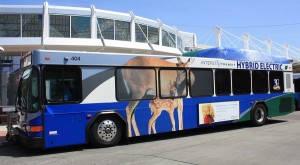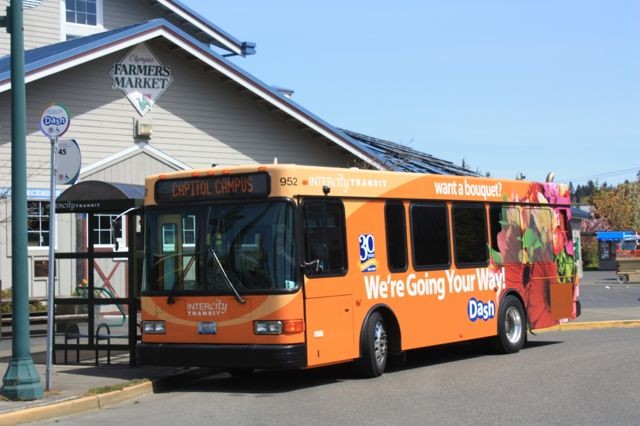Submitted by Intercity Transit
 Intercity Transit, the public transportation agency for Thurston County, recently received ISO 14001 certification for its significant environmental and sustainability efforts. It is one of only nine U.S. transit systems to earn this prestigious certification, achieving a high international standard of environmental management and resource conservation.
Intercity Transit, the public transportation agency for Thurston County, recently received ISO 14001 certification for its significant environmental and sustainability efforts. It is one of only nine U.S. transit systems to earn this prestigious certification, achieving a high international standard of environmental management and resource conservation.
The International Standards Organization (ISO) provides practical tools for addressing operational and business challenges. The ISO 14001:2004 standards, in particular,
outline a framework for an effective environmental management system. ISO 14001 certification provides an assurance that an organization’s management, employees and business vendors are meeting a high threshold of environmentally sound practices.
“Intercity Transit’s sustainability efforts extend to every area of the agency and are embraced by its employees and leadership alike,” said Intercity Transit General Manager Ann Freeman-Manzanares.
“Our work is about making the community a better place to live by providing a diversity of quality transportation services, implementing innovative programs, developing successful partnerships, and acting as a good public steward of the environment we all share.”
Although recognized as an early leader in sustainability, Intercity Transit began its formal work to develop an Environmental & Sustainability Management System following its selection by the U.S. Federal Transit Administration in 2010 to participate in the FTA-sponsored national EMS training program. Coordinated by Virginia Technical University’s EMS Institute, the program provided a two-year, in-depth training to a handful of Intercity Transit managers to create systems, evaluation metrics and process improvement tools that support the agency’s overall sustainability commitment.
In recent years, Intercity Transit’s sustainability efforts have:
- Cut total waste to landfill 10 percent;
- Cut water use 6 percent;
- Reduced electricity use 20 percent;
- Reduced natural gas use 24 percent; and
- Reduced greenhouse gas emissions 13 percent.
In addition to being good environmental stewards, Intercity Transit believes its environmental and sustainable practices also benefit the organization’s bottom line.  Since 2011 Intercity Transit has increased its bus fleet fuel economy through implementing no-idling policies, practicing fuel efficient driving techniques, and adding more hybrid coaches to its fleet when replacing its oldest vehicles. The agency estimates it saves approximately $186,000 each year by not using the equivalent of 62,000 gallons of diesel. And that number will grow as more hybrid coaches are put into service.
Since 2011 Intercity Transit has increased its bus fleet fuel economy through implementing no-idling policies, practicing fuel efficient driving techniques, and adding more hybrid coaches to its fleet when replacing its oldest vehicles. The agency estimates it saves approximately $186,000 each year by not using the equivalent of 62,000 gallons of diesel. And that number will grow as more hybrid coaches are put into service.
In addition to the agency’s Environmental & Sustainability Management System (ESMS), Intercity Transit has an active employee-driven sustainability committee and a sustainability program called Moving Green. This is all supported by its policy board, the Intercity Transit Authority, and an engaged Citizen Advisory Committee.
Intercity Transit is the smallest of the nine transit systems to earn the ISO 14001 certification. The other agencies to have received 14001 certification for environmental management are Sound Transit (WA), LA Metro Transit District and Foothill Transit (CA), Utah Transit Authority (UT), Champaign-Urbana Mass Transit District (IL), SunTran (AZ), New York Metro Transit Authority (NY), and Southeastern Pennsylvania Transit Authority (PA).
Following the ISO certification this spring, Intercity Transit also received a top honor from the Thurston Chamber of Commerce Green Business Program (April 2014). The award recognizes efforts in waste reduction, water conservation, energy efficiency, green purchasing, pollution prevention, and transportation.
Other Intercity Transit accomplishments include receiving the nation’s first gold-level rating for its sustainability commitment from the American Public Transportation Association (APTA) in 2012, based on its efficient management of natural resources including energy, air pollutants, greenhouse gas emissions and water. APTA awards the designation to public- and private-sector organizations that make significant advances in preserving the environment, reducing waste, modeling social responsibility and helping bolster economic vitality in the regions they serve.
Intercity Transit also received the nation’s top honor as the best mid-size transit system by APTA (2009), a Bicycle Friendly Business designation by the League of American Bicyclists (2013), and Project of the Year Award from the American Public Works Association for its park & ride facility built atop an old landfill (2013). The agency was among the first in the country to fuel its fleet with cleaner-burning biodiesel fuel (2001) and the first system in the South Puget Sound region to operate hybrid diesel-electric buses (2010). A full one-third of the Intercity Transit coach fleet will operate with hybrid diesel-electric technology beginning this summer with the arrival of ten additional hybrid buses.
More information about Intercity Transit’s sustainability program, visit http://www.intercitytransit.com/about/sustainability/Pages/default.aspx or email the agency’s sustainability coordinator at jbrandt@intercitytransit.com.





















































